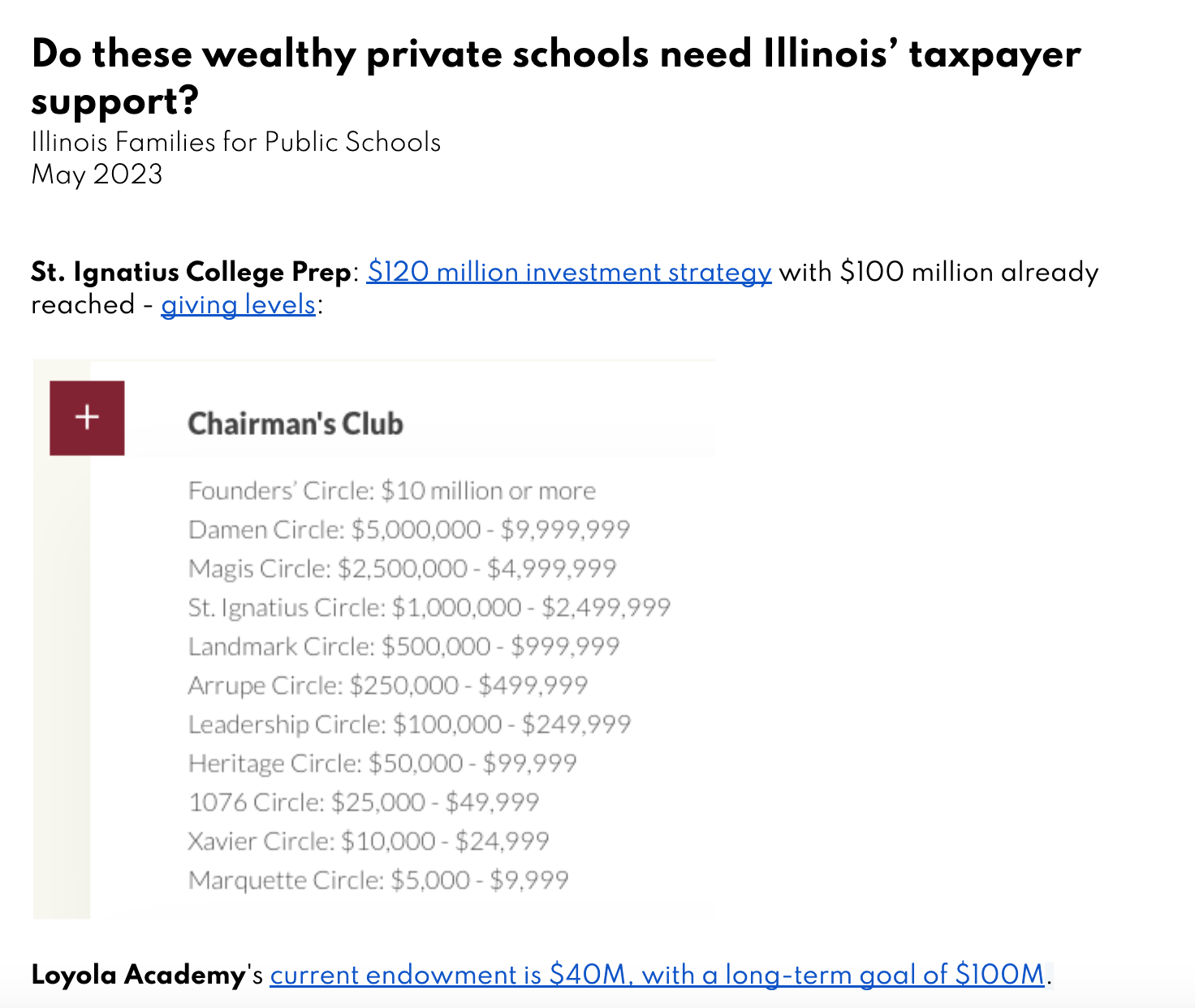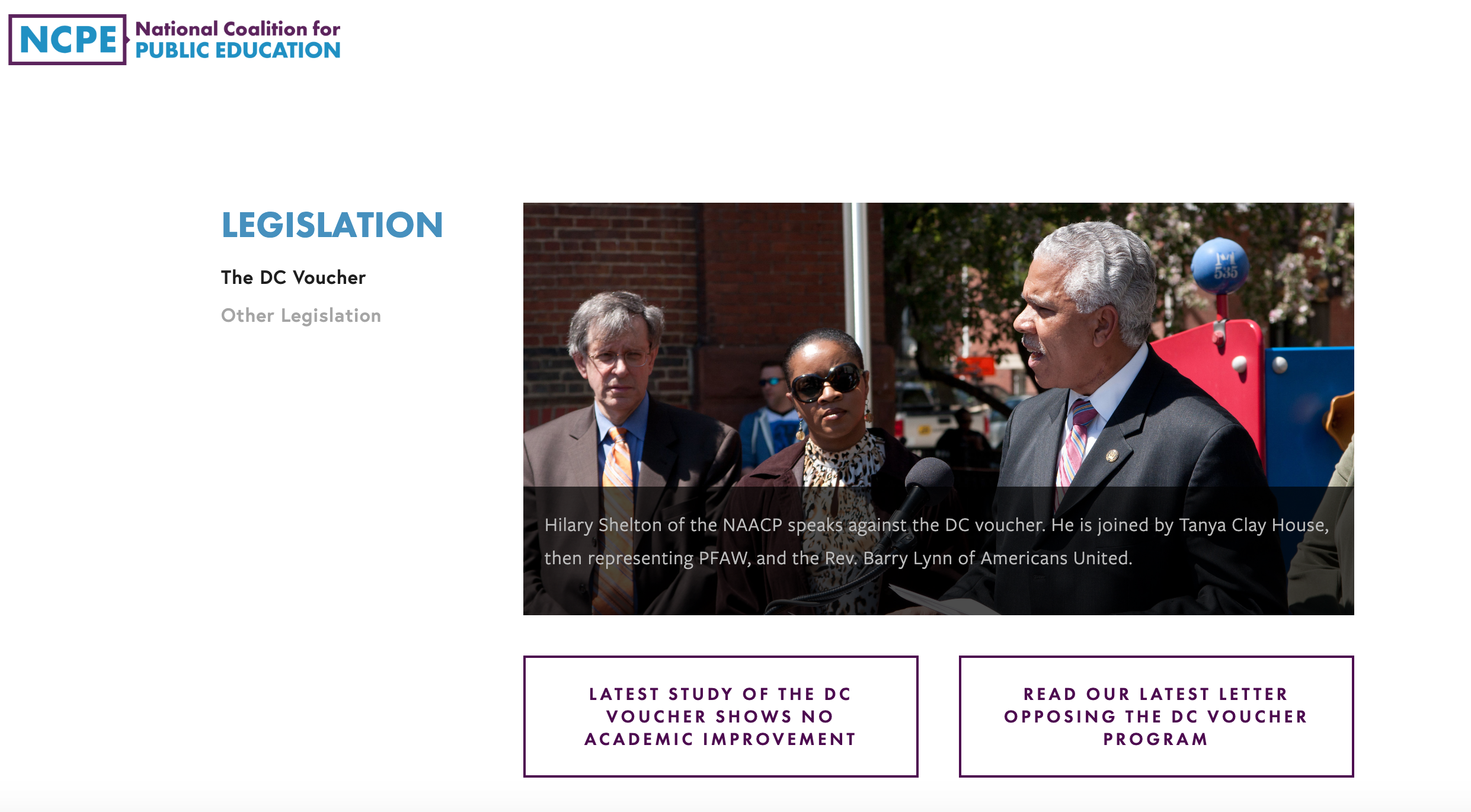ALL RESOURCES
FILTER BY TAG
Select a tag
- Academic performance
- Accessibility
- Accountability
- Advocacy
- Advocates
- Article
- Bill analysis
- Bill tracker
- Billionaires
- Blog post
- Civil rights
- Coalition building
- Community Schools
- Cost impact analysis
- Dark Money
- Data
- Disability
- Discrimination
- Drain funds from public education
- Education Savings Account (ESA)
- English language learners
- Fact sheet
- Fraud Waste and Abuse
- Graphic
- History
- Indigenous and Native Education
- Integration
- LGBTQ+
- Legislation
- Letter
- Litigation
- Messaging or talking points
- Model legislation
- National Voucher
- News
- Parents
- Personal narrative
- Podcast
- Policy brief
- Policymakers
- Radio
- Referendum
- Religion
- Report
- Rural communities
- Segregation
- Separation of church and state
- Slide deck
- Slides
- State Constitutional Right to Education
FILTER BY AUTHOR
Select an author
- Aaron Sanderford
- Alec MacGillis
- Allen Pratt
- Associated Press
- Bob Peterson
- Bruce Schreiner
- Catherine Caruso
- David Montgomery
- David Pepper
- Eli Hager
- Emily Walkenhorst
- Ethan Dewitt
- Geoff Mulvihill
- Hilary Wething
- Howard Fischer
- Jason Bailey
- Jessica Corbett
- Jim Collier
- Joe Dana
- Joshua Cowen
- Juan Perez Jr.
- Kiera Butler
- Laura Pappano
- Liam Amick
- Maurice Cunnningham
- Nora De La Cour
- Paige Masten
- Patrick Darrington
- Paul Hammel
- Phil Williams
- Rob Boston
- Robert Huber
- Rowan Moore Geretsy
- Sasha Pudelski

The PFPS Interview: Reverend Johnson of Pastors for Texas Children
Reverend Charles Foster Johnson, co-pastor of Bread, in Fort Worth, Texas; Founder and Executive Director of Pastors for Texas Children, a faith-based advocacy group that works to promote and advance public schools in Texas; and head of the national Pastors for Children organization spoke to Jessica Levin, Public Funds Public Schools Director. The interview has been edited for length and clarity.

The PFPS Interview: Molly Sweeney, Owen Goslin, and Arlyssa Heard from Michigan’s 482 Forward
PFPS continues to showcase the work of public education advocates across the country in the latest installment of the PFPS interview series. These interviews offer advice and insights for others fighting private school voucher proposals. Given the large number of voucher bills already introduced in the 2023 legislative session, sharing knowledge and inspiration from successful state and local organizations opposing these policies is more crucial than ever. This interview highlights the efforts of dedicated public school advocates in Betsy DeVos’s home state of Michigan, which remains voucher free despite powerful pro-privatization forces once again focusing their energies on establishing a voucher program in the Great Lakes State last year.

Mississippi Constitution: No Public Funds for Private Schools
The Mississippi Constitution is clear: taxpayer dollars may not be appropriated for private schools.
The authors of the State Constitution understood that strong public schools are unique in their contribution to the wellbeing of our communities and our state – and that the greatest threat to this vital common good is the siphoning of public funds to subsidize the private education of a few, creating a system of unequal schools that would divide and weaken our state.

Do these wealthy private schools need Illinois’ taxpayer support?
Illinois Families for Public Schools developed a fact sheet with information and resources about the funding behind wealthy private schools.

New analysis shows many private schools in N.C. have more vouchers than students
This session, General Assembly leaders have placed a massive expansion of the state’s voucher program at the top of their education agenda. Legislative leaders in both the House and the Senate want to triple the program’s size by opening it to wealthy families who have already enrolled their children in private schools. But new data shows that the existing program lacks adequate oversight and is potentially riven with fraud.
Data from the two agencies charged with overseeing private schools and North Carolina’s Opportunity Scholarship voucher program show several cases where schools have received more vouchers than they have students. Several other private schools have received voucher payments from the state after they have ceased submitting enrollment data.

NEPC Review: The Ohio EdChoice Program’s Impact on School District Enrollments, Finances, and Academics
A recent report from the Thomas Fordham Institute, The Ohio EdChoice Program’s Impact on School District Enrollments, Finances, and Academics, considers three possible harms associated with Ohio’s voucher program: to public school student outcomes through com- petition, to district financial resources, and increased racial segregation. Finding that Ohio vouchers have had few such harmful impacts, the report concludes that it has effectively dismissed the primary concerns of voucher critics. Yet, while the report is broadly methodologically sound for the narrow questions it poses, the questions it asks are out-of-date with respect to current concerns raised by voucher critics, which focus on substantially decreased student achievement among students using vouchers.

Vouchers and Public Benefits in the Budget
These slides from Policy Matters Ohio show how the Ohio budget funds school voucher programs compared to other public benefit programs.

State of Ohio Schools 2023
Ohio's students deserve a world-class education, including safe and well-resourced schools that are staffed with teachers who are well trained and fairly paid. Providing that education is our shared responsibility, and we all share its benefits as well: Every family does better when the next generation is prepared for the future, every community is enhanced when its young people are engaged, curious and active participants, and every boss wants a highly qualified hiring pool.
However, the combined effects of the COVID pandemic and Ohio’s legacy of inadequate, inequitable funding have weakened the role school plays as a foundational public institution. Ohio ranks 21st in the nation for K-12 education, 46th for equitable distribution of funding, and 40th in starting teacher salaries. Ohio public schools educate 1.7 million students across racial, gender, socioeconomic and geographic lines — and every one of them deserves better.

Funding Ohio’s Future
School is a place where childhood happens. Ohio’s public educators teach children of all races and backgrounds basic skills, but also challenge and inspire them to follow their dreams. For many students, school is a safe place to learn, develop and grow.
Ohio currently educates 1.6 million children attending school in our cities, suburbs and small towns. For years, almost no one was happy about how the state of Ohio funded public schools. The system pitted communities against each other and private and charter schools against public schools. We were living in the K-12 version of the “Hunger Games”: The wealthier your district, the stronger your chances of success.

The Truth About ESA Vouchers
This webpage from Save Our Schools Arizona provides resources, videos, and fact sheets about Arizona’s ESA voucher program.

Keep Public Funds in Texas Public Schools
Private school voucher bills are being debated in the Texas Legislature again this year. An ever-increasing body of research shows that vouchers negatively affect student achievement, harm rural communities, exacerbate school segregation, promote discrimination, and undermine public school systems that welcome and serve all students. Texas public schools, which educate the vast majority of children, including the largest number of rural students in the country, remain starkly underfunded. Texas lawmakers must continue rejecting proposals for harmful voucher programs and instead use state resources to invest in public schools.

Let the Illinois “Invest in Kids” Private School Voucher Law Sunset
Illinois’ “Invest in Kids” tax credit voucher program is set to sunset after the 2023-2024 school year. This unpopular pilot program should lapse as intended in the law. Illinois should reject any attempt to extend the program or make it permanent, as well as any proposal to establish additional voucher programs. Instead, the state must invest in its underfunded public schools, which, unlike private schools, welcome and serve all students.

Facts About Vouchers
The National Coalition for Public Education has compiled a series of fact sheets on school voucher programs.

Studies and Reports
The National Coalition for Public Education has compiled studies and reports on school voucher programs.

End the ‘Invest in Kids’ Act voucher program
Illinois Families for Public Schools developed a fact sheet on why policy makers should end the Invest in Kids Act voucher program.

What To Know About the Invest In Kids Act
Illinois Families for Public Schools developed a fact sheet in English and Spanish with frequently asked questions about the Invest in Kids Act voucher program.

Lawmakers Refuse to Adopt School Vouchers, For Now
One of the primary concerns during the Texas legislative session was Governor Greg Abbott’s pressure to pass private school vouchers by establishing education savings accounts. Proponents argued that vouchers would empower parents while ignoring all that parents and their children would lose. IDRA and other organizations and individuals expressed concerns about the negative impact vouchers would have on families, public schools and communities (IDRA, 2023; Latham Sikes, April 11, 2023a). Vouchers would divert crucial funds away from already underfunded public schools, exacerbating funding inequities and leaving some students without essential resources (PFPS, 2023).

Public Funds Public Schools Research Page
This webpage from Public Funds Public Schools is a useful tool for policy makers to filter through research on school voucher programs.

Litigation Public Funds Public Schools
Private school voucher programs raise a number of legal issues, and many have faced court challenges. Voucher programs may violate a state constitution's education clause, including a state's obligation to adequately fund public schools or to provide a uniform system of public schools, and other important state constitutional protections.
Voucher lawsuits have also been based on violations of the First Amendment to the U.S. Constitution as well as state constitutional provisions, known as Blaine Amendments or no-aid clauses, that prohibit public funding of religious institutions. Other voucher lawsuits have focused on students' civil rights guarantees.

The DC Voucher
The National Coalition for Public Education has developed an in-depth summary of the DC Voucher program which tracks legislation and includes summaries and links to sources.
